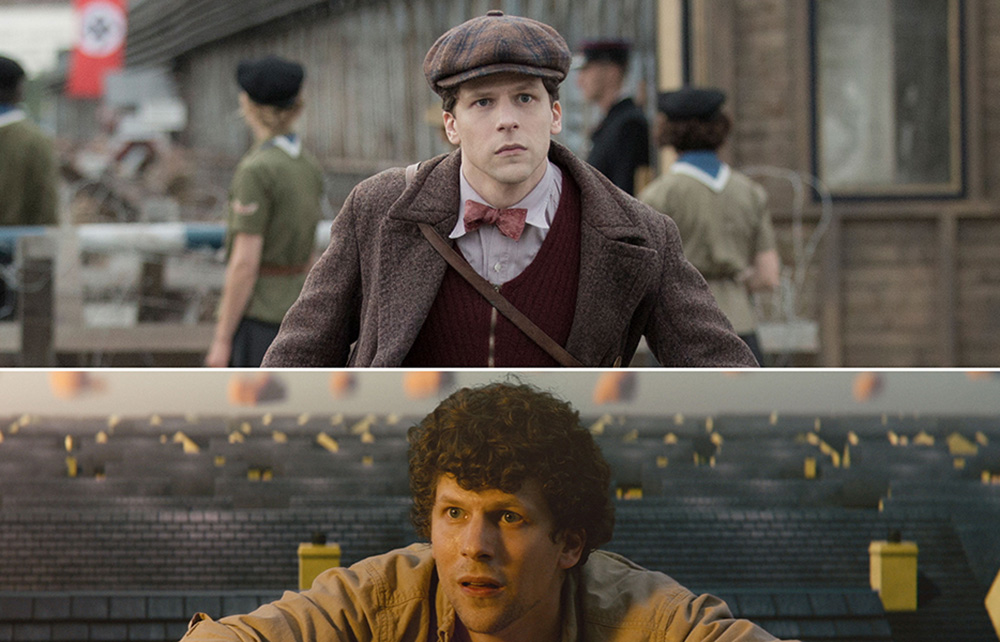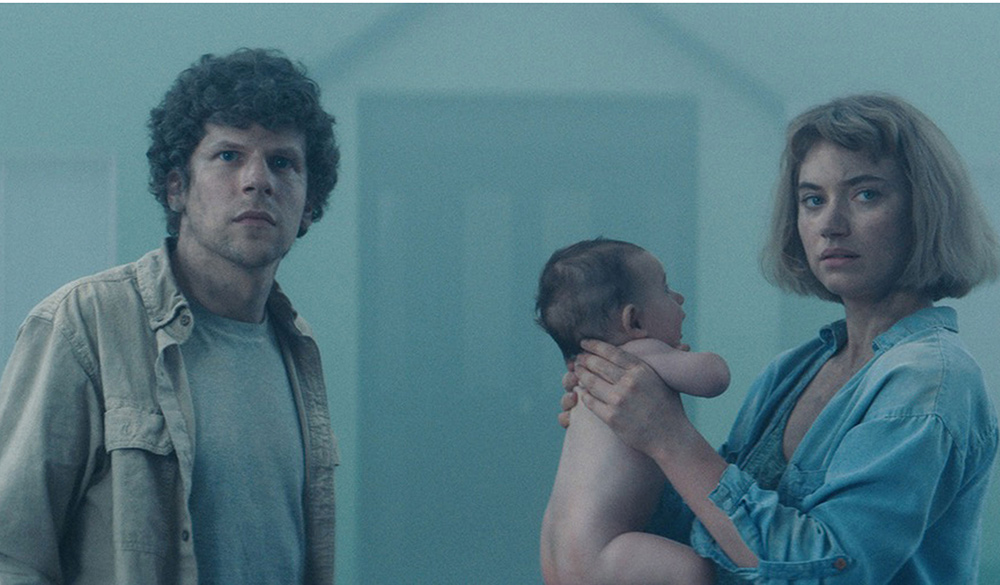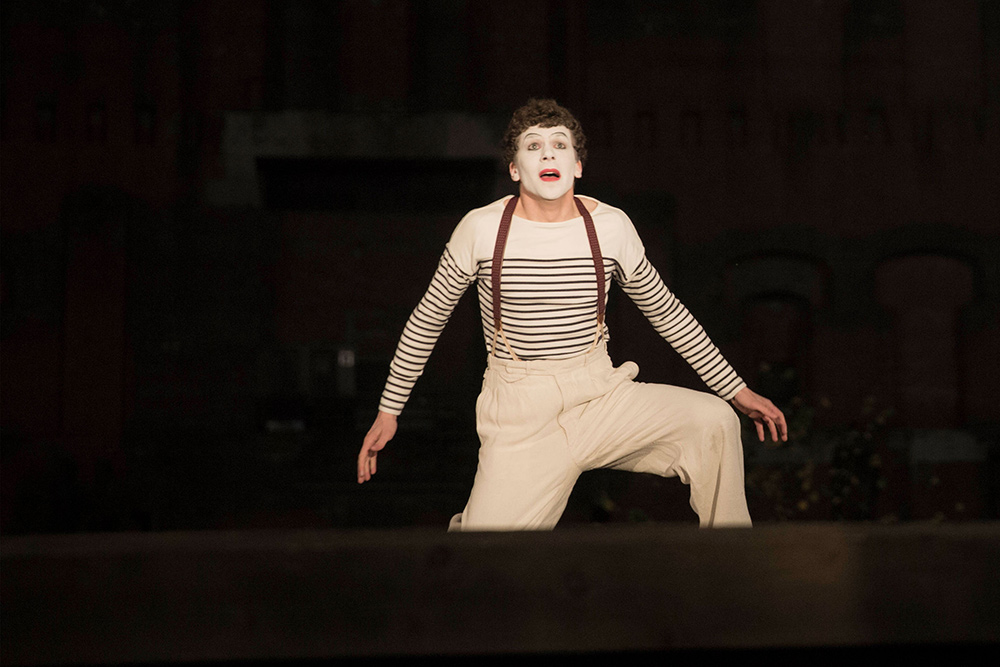
疫情之下,杰西·艾森伯格也坐不住了。
今年36岁的演员、剧作家杰西·艾森伯格是个语速极快的人,而他饰演过的那些最出名的角色——无论是《僵尸之地》(Zombieland)里胆小如鼠的男孩,还是《社交网络》(The Social Network)里雄心勃勃的Facebook创始人马克·扎克伯格,都像是被上了发条一样的神经质。
他总是耷拉着肩膀,脸上挂着似有似无的微笑,一双三角眼时而闪着极度聪明的光,时而像爬行动物一样冷血。他在银幕上的形象就像一个发条人,在好莱坞,貌似没有哪个男影星的形象像他一样,总是与神经质的角色挂钩。即便在电话里,你也能感受到,他在电影中展示出的那种压抑、疯狂的能量,绝不只是某种艺术上的表现。
不久前,《财富》杂志通过电话采访了艾森伯格,请他简要谈谈他最近的两部新片,一部是科幻惊悚片《生态箱》(Vivarium),另一部是二战题材的传记片《无声抵抗》(Resistance,这两部电影都已经在多个平台线上放映)。在采访的前几分钟里,艾森伯格就对自己焦躁不安的语气表示了道歉,并且先对记者提起了问题。特别是问了高架桥的平均高度,以及所谓“限高”到底是限多高。
“我得弄清楚怎么开一辆休旅车。”他解释道。随着新冠肺炎疫情的爆发,他和他的家人也被困在了洛杉矶。“我妻子不会开休旅车,我儿子和我们在一起,但他才3岁,所以你知道,他在这方面也帮不上忙。”
艾森伯格并不是一个在西海岸土生土长的人。他和妻子安娜·斯特劳特基本上是在纽约和美国中西部两头跑——因为她妻子就是中西部地区的人。由于航班因疫情被取消,他们打算开车去印第安那州的布卢明顿,虽然这一路要开30个小时的车,但只要他们能离开洛杉矶,艾森伯格情愿遭这个罪。
作为一个新手爸爸,加上还要应对眼下的疫情,艾森伯格的脑子里想的不只是电影。“这两部片子是在这种极特殊的环境下上映的,我虽然担心这种情况,但这并不会让我觉得自己很肤浅。”他说:“从危机的层面看,它根本不会引起人们的注意。”
虽然上映的环境不尽如人意,但《生态箱》和《无声抵抗》仍然是两部值得关注的影片,因为它们再度扩展了艾森伯格的演技的维度。在两部片子中,他都展现了惊艳而富有张力的表演,打破了他固有的一惊一乍、神经兮兮的银幕形象。
《生态箱》由罗根·费纳根执导,这是一部卡夫卡式的怪诞讽刺作品,表现了郊区生活的无聊。片中,艾森伯格和女主角伊莫珍·波茨饰演了一对正在找房子的夫妇,他们莫名其妙地困在了一个所有房子的建筑风格一模一样的小区,被迫抚养一个神秘的孩子。艾森伯格解释道:“作为一部电影,它就像一个精彩而怪诞的梦,它反映了当下很多人都存在的某种妄想症和幽闭恐惧症,尽管它是以一种更加反乌托邦的形式体现的。”

而在另一部电影,也就是乔纳森·加库波维兹编剧和执导的新片《无声抵抗》中,艾森伯格饰演了传奇哑剧演员马歇·马叟。影片讲述了马歇·马叟早年间的一段鲜为人知的经历。二战期间,马叟曾经是法国抵抗组织的成员。为了逃避纳粹的抓捕,他在战争期间一直过着东躲西藏的日子,并且想方设法从纳粹手中救出了几千名犹太儿童。为了让这些孩子开心,也为了分散他们的注意力,他经常给孩子们表演哑剧。
艾森伯格表示:“我对《无声抵抗》很有共鸣,因为这个哑剧演员必须非常神通广大,能在那样可怕的经历中让孩子们开心起来。而我的大部分时间都用来让我3岁的孩子开心了。只要有什么事情发生,他都能感知到,而且这会让他很有压力。所以我在让他开心的过程中,也变得越来越有心得,而这正是《无声抵抗》的重点所在。”
这两部片子大概是一年半以前拍摄的,时间隔得很紧,几乎是“背靠背”。而且在这两部影片中,艾森伯格都扮演了一个不情愿的父亲的角色,虽然他坚称,自己并不是有意要扮演这种角色。但是在演绎角色的过程中,他也自然而然地代入了自己初为人父的经验。
他说:“作为一个演员,我可能从来没有像现在这样容易产生代入感。我自己也有一个孩子,我每天都要经历这种‘拔河’,他既是一个负担,但也是这个世界上最宝贵的东西。”
《生态箱》是一部更加阴暗和诡异的片子,它将养育孩子当作了一个存在主义的梦魇。艾森伯格饰演的汤姆和伊莫珍·波茨饰演的杰玛是一对夫妇,他们在找房子的过程中,误入了一个像莫比乌斯环一样永远走不出去的小区。他们的精力也逐渐被耗干了,特别是当有人把一个婴儿放在他们家门口之后。婴儿身边还放着一张纸条:“养大这个孩子,就放了你们。”很快,这个孩子长成了一个怪物(儿童时期由萨南·詹宁斯饰演,成人时期由乔纳森·艾里斯饰演),可以以人类根本做不到的方式,变化自己的声音和外形。
“他是一个儿童形态的邪恶寄生虫。”艾森伯格说。在拍摄《生态箱》之前不久,他刚刚有了自己的孩子。“在我拍这部片子的时候,我的儿子就站在片场里,那时他才一岁半。这种感觉很奇怪——我的角色认为那个孩子是一个又恶心、又邪恶的东西。所以这种感觉很奇怪也很惊悚。”
《生态箱》的导演费纳根在接受电话采访时表示,他认为将艾森伯格塑造成一个“大男子主义倾向”的人是一件很有趣的事,他习惯了掌控一切,随着他失去了自由,他也就愈发被激怒了。在影片中,随着汤姆对那个孩子的怒火日益增加,他甚至上升到了肢体暴力的程度。但这一幕,他却演绎得很不容易。
费纳根回忆道:“杰西(艾森伯格)得把萨南抱起来,然后把他摔在地上,我们为那场戏准备了一个很大的缓冲垫。一开始,杰西摔得太轻了。连萨南自己都说:‘杰西,把我摔得重一点。’意思是要让杰西对他再暴力一些。但杰西的儿子也在那里,所以,我觉得他是想树立一个和蔼体贴的父亲形象。”
与《生态箱》相比,《无声抵抗》以一种更人性化、更乐观主义的方式表现了一个父亲的形象。《生态箱》中的汤姆是逐渐陷入仇恨和绝望之中的,而《无声抵抗》中的马叟却是措手不及地承担了父亲的责任。虽然这是电影独特的风格和立意使然,但艾森伯格表示,他也认真思考过,不同的外部环境,是如何塑造了这两个角色截然相反的性格的。
他解释道:“《生态箱》发生在一个超现实主义的世界里,它几乎把人物的生命都吸走了,所以那里有一种绝望感。由于《生态箱》的角色是很孤独的,所以他们变得很沮丧,丧失了所有的意义感。而在《无声抵抗》中,马叟有一种意义感,因为他是被需要的。这让他在这场危机中有了一种目标和希望。作为一个孩子的父亲,在当前的这场危机中,我也感到了这种意义感,觉得自己没有理由自私或放纵。”
对艾森伯格来说,《无声抵抗》从很多方面都让他产生了代入感。艾森伯格自己就成长在一个世俗化的犹太家庭里,他的亲人中也有人死于纳粹的屠刀,他的祖辈曾经生活在离马叟所在的城市只有几小时路程的地方,他至今有一个表亲住在波兰。另外,他的母亲就曾是一位小丑演员。
艾森伯格的童年是在新泽西州的东布伦斯维克度过的,在他小时候,他的母亲经常用“伯纳比妮”的艺名,在生日派对上或者是在医院里为病人进行小丑表演。艾森伯格回忆道:“我母亲过去经常化和马叟一样的妆,直到我后来看了马叟的电影,我才知道,我的母亲受了他很大的启发。她在成长的过程中一直很崇拜他。她甚至看过几场马叟的现场演出。而我从小是看着她化着马叟的妆长大的。但是直到我开始拍摄这部电影,我才明白了这一切。”

《无声抵抗》的导演加库波维兹在接受电话采访时表示,他之所以让艾森伯格主演这部片子,一定程度上也是由于艾森伯格在现实生活中的成长背景,并称这是一个“他天生适合扮演的角色”。加库波维兹是一位委内瑞拉裔导演,他最出名的作品是2005年的《暴力特快》(Secuestro Express)。而马叟作为一名伟大的艺术家,最令他感动之处,就是他为了追求更大的善,而放弃了人性中更自我的一面。
加库波维兹评价道:“让杰西这样的人来演这个角色,最好的一点,就在于他很擅长扮演那种纠结的、阴暗的、让你很容易去‘恨’他的角色。但这个角色从很多方面恰恰相反,马叟的人性是很伟大的,但他总是在与自己善的一面做斗争,总是试图逃避去做一个英雄,好让自己可以做一个艺术家。”
为了进入角色,艾森伯格首先要学习马叟的哑剧表演风格,不过这个过程可能并没有其他演员学起来那么难。“对我来说,我母亲的工作在某种程度上已经向我灌输了抽象表演的风格。我的表演是很写实的。电影表演一般都是写实性的表演,而且我的表现也是很写实的。但是马叟是一个抽象表演的大师,他的目标是要唤起人们的一种感觉。”
为了准备这个角色,艾森伯格花了9个月的时间,跟随哑剧演员洛林·埃里克·萨尔姆学习哑剧。萨尔姆是马叟生前的学生(马叟于2007年去世),曾经跟随马叟学习过很多年。受马叟作品的启发,他们一起编排了很多动作,特别是根据艾森伯格的节奏作了一些调整。同时艾森伯格也经常向母亲取经。
“有时候,我觉得自己的表演很傻,她就会告诉我,她从来没有觉得自己的表演很傻。她装扮成一个小丑的样子,但她表演的对象,却是那些情况最糟糕的孩子,他们将她视作一道生命线,视作一个快乐的源泉。你可能会说,这是一种愚蠢的、简单的表演风格。但从某种角度上看,它是更有价值的,也是更被需要的。”
在拍摄片中最令人难忘的一幕时,艾森伯格还将他的母亲带到了片场——那是战争结束时,马叟在纽伦堡为乔治·巴顿将军的部队表演。“我化着她曾经化过的妆,在纽伦堡为这些军队表演。这真是一种奇妙的联系。”
在《无声抵抗》的另一幕中,马叟为一群刚从纳粹集中营被秘密转移到一座法国城堡中的犹太孤儿表演了哑剧。当孩子们看到他的表演时,他们的疲惫一扫而空,取而代之的是一种天真的快乐。加库波维兹回忆道,在拍摄这一幕的过程中,艾森伯格完全迷失了自我。
“杰西后来告诉我,当他站在这些孩子们面前时,他完全忘记了那些小的细节,注意力全部集中在逗那些孩子笑上。”他说:“我觉得这就是马歇·马叟何以成为一名艺术家,这就是他与观众沟通的方式。孩子们是真的在笑,是真的在对他的表演做出反应,而杰西也是在对他们的反应继续做出反应。他很感动,也很高兴自己能让他们开心。如果你觉得你的艺术只是为了你自己,那么你就还没有发现它。”
在艾森伯格看来,《无声抵抗》的中心思想,就是艺术要有同理心,这也是近年来他牢牢记在心里的一个目标。“作为一名艺人,我认为我做的很多事情,都是在自我放纵,是在自恋。我有一个最好的朋友是服刑儿童的老师,而我的妻子也是一名老师,她的学生是纽约的那些在最艰难的环境中成长的孩子。所以我一直记得这一点。这部电影描绘了在最极端的环境下,你可以怎样利用你的艺术来造福他人。”
艾森伯格正急着赶往印第安纳州,在那里,他可以暂时从关于疫情的一连串令人恐慌的新闻中解脱出来,多陪陪自己的儿子。他们父子俩最爱看的动画片是《小猪佩奇》(Peppa Pig)。“我不知道它掺了什么药,但它是世界上最让人上瘾和最能让人平静的东西了。一旦我们看完了所有的剧集——它总共几千集,而且我估计我们肯定已经快看完了——我肯定要变得更有创意一点。”
艾森伯格和妻子还打算花些时间在他丈母娘经营了35年的家庭暴力庇护所里做志愿者。他说:“希望我们能在那里发挥一些价值。当你被别人需要的时候,它会给你一种希望感。至少它会提醒你,世界上还有其他人需要你。在某种程度上,这比单纯的生存更有意义。”(财富中文网)
译者:隋远洙
疫情之下,杰西·艾森伯格也坐不住了。
今年36岁的演员、剧作家杰西·艾森伯格是个语速极快的人,而他饰演过的那些最出名的角色——无论是《僵尸之地》(Zombieland)里胆小如鼠的男孩,还是《社交网络》(The Social Network)里雄心勃勃的Facebook创始人马克·扎克伯格,都像是被上了发条一样的神经质。
他总是耷拉着肩膀,脸上挂着似有似无的微笑,一双三角眼时而闪着极度聪明的光,时而像爬行动物一样冷血。他在银幕上的形象就像一个发条人,在好莱坞,貌似没有哪个男影星的形象像他一样,总是与神经质的角色挂钩。即便在电话里,你也能感受到,他在电影中展示出的那种压抑、疯狂的能量,绝不只是某种艺术上的表现。
不久前,《财富》杂志通过电话采访了艾森伯格,请他简要谈谈他最近的两部新片,一部是科幻惊悚片《生态箱》(Vivarium),另一部是二战题材的传记片《无声抵抗》(Resistance,这两部电影都已经在多个平台线上放映)。在采访的前几分钟里,艾森伯格就对自己焦躁不安的语气表示了道歉,并且先对记者提起了问题。特别是问了高架桥的平均高度,以及所谓“限高”到底是限多高。
“我得弄清楚怎么开一辆休旅车。”他解释道。随着新冠肺炎疫情的爆发,他和他的家人也被困在了洛杉矶。“我妻子不会开休旅车,我儿子和我们在一起,但他才3岁,所以你知道,他在这方面也帮不上忙。”
艾森伯格并不是一个在西海岸土生土长的人。他和妻子安娜·斯特劳特基本上是在纽约和美国中西部两头跑——因为她妻子就是中西部地区的人。由于航班因疫情被取消,他们打算开车去印第安那州的布卢明顿,虽然这一路要开30个小时的车,但只要他们能离开洛杉矶,艾森伯格情愿遭这个罪。
作为一个新手爸爸,加上还要应对眼下的疫情,艾森伯格的脑子里想的不只是电影。“这两部片子是在这种极特殊的环境下上映的,我虽然担心这种情况,但这并不会让我觉得自己很肤浅。”他说:“从危机的层面看,它根本不会引起人们的注意。”
虽然上映的环境不尽如人意,但《生态箱》和《无声抵抗》仍然是两部值得关注的影片,因为它们再度扩展了艾森伯格的演技的维度。在两部片子中,他都展现了惊艳而富有张力的表演,打破了他固有的一惊一乍、神经兮兮的银幕形象。
《生态箱》由罗根·费纳根执导,这是一部卡夫卡式的怪诞讽刺作品,表现了郊区生活的无聊。片中,艾森伯格和女主角伊莫珍·波茨饰演了一对正在找房子的夫妇,他们莫名其妙地困在了一个所有房子的建筑风格一模一样的小区,被迫抚养一个神秘的孩子。艾森伯格解释道:“作为一部电影,它就像一个精彩而怪诞的梦,它反映了当下很多人都存在的某种妄想症和幽闭恐惧症,尽管它是以一种更加反乌托邦的形式体现的。”
而在另一部电影,也就是乔纳森·加库波维兹编剧和执导的新片《无声抵抗》中,艾森伯格饰演了传奇哑剧演员马歇·马叟。影片讲述了马歇·马叟早年间的一段鲜为人知的经历。二战期间,马叟曾经是法国抵抗组织的成员。为了逃避纳粹的抓捕,他在战争期间一直过着东躲西藏的日子,并且想方设法从纳粹手中救出了几千名犹太儿童。为了让这些孩子开心,也为了分散他们的注意力,他经常给孩子们表演哑剧。
艾森伯格表示:“我对《无声抵抗》很有共鸣,因为这个哑剧演员必须非常神通广大,能在那样可怕的经历中让孩子们开心起来。而我的大部分时间都用来让我3岁的孩子开心了。只要有什么事情发生,他都能感知到,而且这会让他很有压力。所以我在让他开心的过程中,也变得越来越有心得,而这正是《无声抵抗》的重点所在。”
这两部片子大概是一年半以前拍摄的,时间隔得很紧,几乎是“背靠背”。而且在这两部影片中,艾森伯格都扮演了一个不情愿的父亲的角色,虽然他坚称,自己并不是有意要扮演这种角色。但是在演绎角色的过程中,他也自然而然地代入了自己初为人父的经验。
他说:“作为一个演员,我可能从来没有像现在这样容易产生代入感。我自己也有一个孩子,我每天都要经历这种‘拔河’,他既是一个负担,但也是这个世界上最宝贵的东西。”
《生态箱》是一部更加阴暗和诡异的片子,它将养育孩子当作了一个存在主义的梦魇。艾森伯格饰演的汤姆和伊莫珍·波茨饰演的杰玛是一对夫妇,他们在找房子的过程中,误入了一个像莫比乌斯环一样永远走不出去的小区。他们的精力也逐渐被耗干了,特别是当有人把一个婴儿放在他们家门口之后。婴儿身边还放着一张纸条:“养大这个孩子,就放了你们。”很快,这个孩子长成了一个怪物(儿童时期由萨南·詹宁斯饰演,成人时期由乔纳森·艾里斯饰演),可以以人类根本做不到的方式,变化自己的声音和外形。
“他是一个儿童形态的邪恶寄生虫。”艾森伯格说。在拍摄《生态箱》之前不久,他刚刚有了自己的孩子。“在我拍这部片子的时候,我的儿子就站在片场里,那时他才一岁半。这种感觉很奇怪——我的角色认为那个孩子是一个又恶心、又邪恶的东西。所以这种感觉很奇怪也很惊悚。”
《生态箱》的导演费纳根在接受电话采访时表示,他认为将艾森伯格塑造成一个“大男子主义倾向”的人是一件很有趣的事,他习惯了掌控一切,随着他失去了自由,他也就愈发被激怒了。在影片中,随着汤姆对那个孩子的怒火日益增加,他甚至上升到了肢体暴力的程度。但这一幕,他却演绎得很不容易。
费纳根回忆道:“杰西(艾森伯格)得把萨南抱起来,然后把他摔在地上,我们为那场戏准备了一个很大的缓冲垫。一开始,杰西摔得太轻了。连萨南自己都说:‘杰西,把我摔得重一点。’意思是要让杰西对他再暴力一些。但杰西的儿子也在那里,所以,我觉得他是想树立一个和蔼体贴的父亲形象。”
与《生态箱》相比,《无声抵抗》以一种更人性化、更乐观主义的方式表现了一个父亲的形象。《生态箱》中的汤姆是逐渐陷入仇恨和绝望之中的,而《无声抵抗》中的马叟却是措手不及地承担了父亲的责任。虽然这是电影独特的风格和立意使然,但艾森伯格表示,他也认真思考过,不同的外部环境,是如何塑造了这两个角色截然相反的性格的。
他解释道:“《生态箱》发生在一个超现实主义的世界里,它几乎把人物的生命都吸走了,所以那里有一种绝望感。由于《生态箱》的角色是很孤独的,所以他们变得很沮丧,丧失了所有的意义感。而在《无声抵抗》中,马叟有一种意义感,因为他是被需要的。这让他在这场危机中有了一种目标和希望。作为一个孩子的父亲,在当前的这场危机中,我也感到了这种意义感,觉得自己没有理由自私或放纵。”
对艾森伯格来说,《无声抵抗》从很多方面都让他产生了代入感。艾森伯格自己就成长在一个世俗化的犹太家庭里,他的亲人中也有人死于纳粹的屠刀,他的祖辈曾经生活在离马叟所在的城市只有几小时路程的地方,他至今有一个表亲住在波兰。另外,他的母亲就曾是一位小丑演员。
艾森伯格的童年是在新泽西州的东布伦斯维克度过的,在他小时候,他的母亲经常用“伯纳比妮”的艺名,在生日派对上或者是在医院里为病人进行小丑表演。艾森伯格回忆道:“我母亲过去经常化和马叟一样的妆,直到我后来看了马叟的电影,我才知道,我的母亲受了他很大的启发。她在成长的过程中一直很崇拜他。她甚至看过几场马叟的现场演出。而我从小是看着她化着马叟的妆长大的。但是直到我开始拍摄这部电影,我才明白了这一切。”
《无声抵抗》的导演加库波维兹在接受电话采访时表示,他之所以让艾森伯格主演这部片子,一定程度上也是由于艾森伯格在现实生活中的成长背景,并称这是一个“他天生适合扮演的角色”。加库波维兹是一位委内瑞拉裔导演,他最出名的作品是2005年的《暴力特快》(Secuestro Express)。而马叟作为一名伟大的艺术家,最令他感动之处,就是他为了追求更大的善,而放弃了人性中更自我的一面。
加库波维兹评价道:“让杰西这样的人来演这个角色,最好的一点,就在于他很擅长扮演那种纠结的、阴暗的、让你很容易去‘恨’他的角色。但这个角色从很多方面恰恰相反,马叟的人性是很伟大的,但他总是在与自己善的一面做斗争,总是试图逃避去做一个英雄,好让自己可以做一个艺术家。”
为了进入角色,艾森伯格首先要学习马叟的哑剧表演风格,不过这个过程可能并没有其他演员学起来那么难。“对我来说,我母亲的工作在某种程度上已经向我灌输了抽象表演的风格。我的表演是很写实的。电影表演一般都是写实性的表演,而且我的表现也是很写实的。但是马叟是一个抽象表演的大师,他的目标是要唤起人们的一种感觉。”
为了准备这个角色,艾森伯格花了9个月的时间,跟随哑剧演员洛林·埃里克·萨尔姆学习哑剧。萨尔姆是马叟生前的学生(马叟于2007年去世),曾经跟随马叟学习过很多年。受马叟作品的启发,他们一起编排了很多动作,特别是根据艾森伯格的节奏作了一些调整。同时艾森伯格也经常向母亲取经。
“有时候,我觉得自己的表演很傻,她就会告诉我,她从来没有觉得自己的表演很傻。她装扮成一个小丑的样子,但她表演的对象,却是那些情况最糟糕的孩子,他们将她视作一道生命线,视作一个快乐的源泉。你可能会说,这是一种愚蠢的、简单的表演风格。但从某种角度上看,它是更有价值的,也是更被需要的。”
在拍摄片中最令人难忘的一幕时,艾森伯格还将他的母亲带到了片场——那是战争结束时,马叟在纽伦堡为乔治·巴顿将军的部队表演。“我化着她曾经化过的妆,在纽伦堡为这些军队表演。这真是一种奇妙的联系。”
在《无声抵抗》的另一幕中,马叟为一群刚从纳粹集中营被秘密转移到一座法国城堡中的犹太孤儿表演了哑剧。当孩子们看到他的表演时,他们的疲惫一扫而空,取而代之的是一种天真的快乐。加库波维兹回忆道,在拍摄这一幕的过程中,艾森伯格完全迷失了自我。
“杰西后来告诉我,当他站在这些孩子们面前时,他完全忘记了那些小的细节,注意力全部集中在逗那些孩子笑上。”他说:“我觉得这就是马歇·马叟何以成为一名艺术家,这就是他与观众沟通的方式。孩子们是真的在笑,是真的在对他的表演做出反应,而杰西也是在对他们的反应继续做出反应。他很感动,也很高兴自己能让他们开心。如果你觉得你的艺术只是为了你自己,那么你就还没有发现它。”
在艾森伯格看来,《无声抵抗》的中心思想,就是艺术要有同理心,这也是近年来他牢牢记在心里的一个目标。“作为一名艺人,我认为我做的很多事情,都是在自我放纵,是在自恋。我有一个最好的朋友是服刑儿童的老师,而我的妻子也是一名老师,她的学生是纽约的那些在最艰难的环境中成长的孩子。所以我一直记得这一点。这部电影描绘了在最极端的环境下,你可以怎样利用你的艺术来造福他人。”
艾森伯格正急着赶往印第安纳州,在那里,他可以暂时从关于疫情的一连串令人恐慌的新闻中解脱出来,多陪陪自己的儿子。他们父子俩最爱看的动画片是《小猪佩奇》(Peppa Pig)。“我不知道它掺了什么药,但它是世界上最让人上瘾和最能让人平静的东西了。一旦我们看完了所有的剧集——它总共几千集,而且我估计我们肯定已经快看完了——我肯定要变得更有创意一点。”
艾森伯格和妻子还打算花些时间在他丈母娘经营了35年的家庭暴力庇护所里做志愿者。他说:“希望我们能在那里发挥一些价值。当你被别人需要的时候,它会给你一种希望感。至少它会提醒你,世界上还有其他人需要你。在某种程度上,这比单纯的生存更有意义。”(财富中文网)
译者:隋远洙
Jesse Eisenberg can’t sit still.
This won't shock fans of the 36-year-old actor, playwright, and avowed fast-talker, whose best-known characters—from a nebbish apocalypse holdout in Zombieland to Facebook founder Mark Zuckerberg, all cutthroat ambition, in The Social Network—whir and wheel as if wound up by a key.
With slouched shoulders, a thin smile, and hooded eyes that flit between ferociously intelligent and reptilian cold, Eisenberg’s onscreen persona is that of a coiled spring, and perhaps no leading man in Hollywood is as tied to a particular trait as he is to this brand of fussy, full-body neurosis. Even when Eisenberg speaks by phone, one soon senses the same pent-up, squirrelly energy he has so effectively weaponized across all levels of film, from indie darlings to superhero blockbusters, isn’t just some actorly affect.
Within the first few minutes of a call with Fortune last Friday to ostensibly discuss the two very different projects he has out this week, sci-fi puzzle-box Vivarium and WWII biodrama Resistance (both on demand and on assorted digital platforms), Eisenberg has already apologized for sounding restless and managed to turn the tables on his interviewer. Specifically, he’s inquiring about the average height of overpasses, how “low” is really meant by “low clearance.”
“I need to figure out how to drive an RV,” the actor explains as he drives around Los Angeles, where he and his family had become unexpectedly grounded amid the coronavirus crisis. “My wife can’t drive one, and my son is with us but he’s 3 years old, so as you might imagine he’s not much help in that department.”
Eisenberg’s famously not a West Coast guy. He and his wife, Anna Strout, split their time between New York and the Midwest, where she’s from. With flights off the table, they’ll soon hit the road for Bloomington, Ind., a 30-hour drive Eisenberg’s willing to tackle if it gets them out of L.A.
Between being a relatively new parent and navigating a pandemic, Eisenberg has more on his mind than movies. “That the projects are coming out under these very strange circumstances is not something that would make me feel anything less than completely shallow for being concerned about,” he says. “On the level of crises, it just doesn’t register.”
And yet, circumstances be as they may, Vivarium and Resistance are still notable in how they draw out seldom-seen dimensions of Eisenberg’s star power. In both, he delivers surprising and intense performances that push against the well-established borders of his timid, hyperintellectual persona.
The former, directed by Lorcan Finnegan, is a squirmy, Kafka-esque satire of suburban ennui; Eisenberg and Imogen Poots play a house-hunting couple trapped without explanation in a creepily identikit housing development, where they’re asked to raise a mysterious child. “It’s this brilliant fever dream of a movie,” Eisenberg explains. “And it speaks to a certain kind of claustrophobia and paranoia a lot of people are feeling right now, though it’s a more dystopian version.”
His other film, Resistance, finds the actor playing the legendary mime artist Marcel Marceau across his lesser-known early years as a member of the French Resistance. As covered in the drama, written and directed by Jonathan Jakubowicz, Marceau lived in hiding throughout the war and worked to rescue thousands of Jewish children from the Nazis, often using performance art in order to delight and distract them.
“Resistance is seemingly relevant in the sense that it’s about this mime who has to be resourceful to keep kids entertained during a terrifying experience,” Eisenberg says. “Most of my days are spent trying to keep my 3-year-old happy, because he can sense something’s happening and it’s stressing him out. I’m becoming increasingly resourceful about how I entertain him, which is what Resistance is about.”
Broadly speaking, both projects—which shot practically back-to-back, about a year and a half ago—find Eisenberg thrust into the role of a reluctant father figure, though he maintains that he wasn’t intentionally looking to play such characters. Still, it was only natural for him to draw from his own experiences as a new parent.
“It’s probably never been easier for me to relate to that as an actor,” he says. “I have a child and I’m experiencing that push-and-pull every day, of being inconvenienced by the most precious thing in the world.”
Vivarium, the much darker and stranger of the two projects, treats parenting as an existential nightmare. Unable to escape their unnaturally polished Möbius strip of a neighborhood, Eisenberg’s Tom and Poots’s Gemma are gradually sapped of their strength, especially after a baby is delivered to their doorstep. “Raise the child, and be released,” reads the ominous note attached. Soon it grows into a monstrous entity (played by Senan Jennings as a child, then Jonathan Aris as an adult) that can distort its voice and appearance in inhuman ways.
“He’s this demonic parasite of a child,” says Eisenberg, who shot Vivariumshortly after becoming a parent for the first time. “When I was filming the movie, my son was standing on the set. He was 1-and-a-half. And it was strange; my character views this kid as disgusting and demonic, so that was oddly horrific.”
Vivarium director Finnegan, speaking by phone, says he thought it would be interesting to cast Eisenberg as an “alpha male type,” someone used to being in control and increasingly infuriated by the loss of his freedom. He recalls Eisenberg struggling with scenes in which Tom reacts with particular anger toward the child, becoming physically violent.
“Jesse had to pick Senan up and throw him down on the ground, and we had a big crash pad for that scene,” says Finnegan. “And Jesse was a little too gentle at first, and Senan was like, ‘Jesse, chuck me harder.’ He was, like, pushing Jesse to be more violent with him. But Jesse’s son was there, so I suppose he was trying to be a nice, considerate father figure.”
Resistance approaches parenthood in a more humane, optimistic manner than Vivarium; where Tom gradually collapses into hatred and despair, Marceau rises to the occasion when he’s thrust into an unexpected paternal role. And while that’s obviously a product of the films’ distinct genres and intentions, Eisenberg says he thought about how external environments informed the nearly diametrically opposed headspaces of his characters.
“Because Vivarium takes place in this surreal universe that’s literally sucking the life out of its characters, there’s a hopelessness there,” he explains. “And because the characters are so alone in Vivarium, they become despondent and lose any sense of meaning. In Resistance, Marceau has a sense of meaning, because he’s needed. It gives him a sense of purpose and hope in the midst of this crisis. I feel it now, having a child during this current crisis, because I have the sense I can’t be selfish or indulgent.”
For Eisenberg, Resistance hit close to home in more ways than one. Raised a secular Jew, the actor lost family during the Holocaust, and his ancestors once lived within a few hours of Marceau’s city of origin. One of his cousins still lives in Poland. And then there was the matter of his mother, the clown.
Throughout Eisenberg’s childhood in East Brunswick, N.J., his mother performed under the name Bonabini, clowning at birthday parties and for patients in tristate-area hospitals. “My mother used to put on basically the same makeup Marceau wore,” he says. “It didn’t occur to me until I started watching Marceau that my mother was really inspired by him. She adored him growing up. She’d seen him live a few times, and I grew up looking at my mom wearing Marceau’s makeup and not putting it together until I started doing this movie.”
Jakubowicz, speaking by phone, says he cast Eisenberg based in part on those real-life connections, calling it “a role he was born to play.” The Venezuelan director, best known for 2005’s Secuestro Express, was interested in bringing out the central tension of Marceau as an aspiring artist forced to set aside his more egotistical side for the greater good.
“What’s fascinating about having a guy like Jesse play this role is that he is the master of playing tormented, dark characters you love to hate,” notes the director. “This role is in many ways the opposite of that. The humanity of Marcel is so big, but he’s also always battling his good side, trying to get away from being a hero so he can go become an artist.”
Getting into character, Eisenberg perhaps struggled less than other actors would have to take Marceau’s comic routines seriously. “My mother’s work in some way validated the more abstract performance art, for me,” says Eisenberg. “My work is so literal. Movie acting, especially playing naturalistic characters, is so literal, and my plays are so naturalistic. But what Marceau did so well was embrace abstract performance; he was trying to evoke a feeling.”
To prepare for the role, Eisenberg spent nine months training with the mime Lorin Eric Salm, who had been a student of Marceau’s in France for years before his death in 2007. Together, they choreographed routines inspired by Marceau’s work, specifically tailoring them to suit Eisenberg’s distinct rhythms as a performer. He kept in contact with his mother, as well.
“At moments when I thought there was something silly about what I was performing, I would go back to her and talk with her about the fact she never thought of herself as silly,” explains the actor. “She was dressed as a clown, but she was performing for kids in the most dire circumstances who viewed her as this necessary lifeline to something that was joyful. You could argue that, well, it’s a sillier and less sophisticated style of performance, but in some ways it’s so much more valuable and needed.”
Eisenberg brought his mother out to the set in Nuremberg while filming one of the film’s most memorable scenes, in which Marceau performs on stage for Gen. George S. Patton’s troops at the end of the war. “I was dressed in the makeup she’d worn, performing for these troops in Nuremberg,” says Eisenberg. “It was just this really wonderful connection.”
During another scene in Resistance, Marceau play-acts for Jewish orphans who’ve been secretly diverted from concentration camps to a French castle. As they watch his routine, exhaustion is momentarily displaced by a more innocent flickering of joy. While filming, Jakubowicz says he saw Eisenberg lose himself in that moment.
“Jesse later told me that when he was in front of the children, he forgot about the little details and 100% focused on making the children laugh,” he says. “And I think that is the essence that makes Marcel Marceau who he became as an artist. It’s how he connects to his audience. The children are actually laughing and reacting to what he’s doing, and Jesse is reacting to the fact they’re reacting. He’s so moved and so happy he can entertain them. If you think your art is for yourself, you haven’t found it yet.”
To Eisenberg, making art as empathy is at the center of Resistance, as well as a more stated mission he’s taken to heart in recent years. “I think a lot of what I do is self-indulgent and narcissistic, being an artist,” he says. “But my best friend is a teacher for incarcerated kids, and my wife is a teacher for kids who grew up in the toughest circumstances in New York. So it’s on my mind all the time; this movie depicts the most extreme version of using your art for the benefit of others.”
The actor’s eager to reach Indiana, where he plans to unplug from the dread-inducing news cycle and spend time with his son, with whom he’s been bingeing Peppa Pig, a popular animated series for kids. “I don’t know if it’s laced with some kind of drug, but that’s the most addictive, calming thing in the world,” he says. “I imagine once we finish all the episodes, of which there are thousands and which we must be close to finishing, I’ll have to get a little more creative.”
Eisenberg and his wife will also spend time volunteering at the domestic-violence shelter his wife’s mother ran for 35 years. “Hopefully, we can be of value there,” he says. “When you’re needed, it gives you a sense of hope, or at least it reminds you there are others who need you. And in a way, that’s more meaningful than just surviving.”






